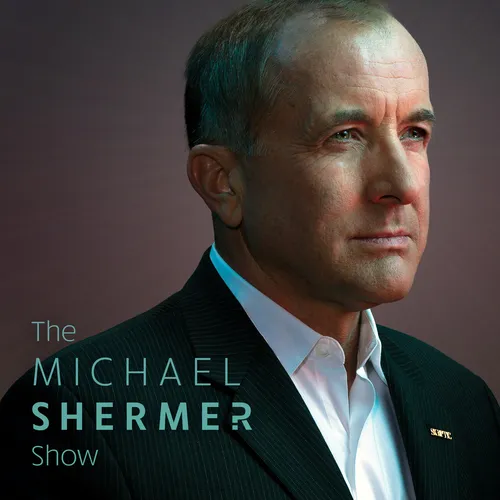
The Michael Shermer Show
The Michael Shermer Show is a series of long-form conversations between Dr. Michael Shermer and leading scientists, philosophers, historians, scholars, writers and thinkers about the most important issues of our time.
- Update frequency
- every 4 days
- Average duration
- 90 minutes
- Episodes
- 550
- Years Active
- 2015 - 2025

106. Daniel Chirot — You Say You Want a Revolution? Radical Idealism and its Tragic Consequences
Why have so many of the iconic revolutions of modern times ended in bloody tragedies? What lessons can be drawn from these failures today, in a world where political extremism is on the rise and rati…

105. Diana Pasulka — American Cosmic: UFOs, Religion, Technology
More than half of American adults and more than 75 percent of young Americans believe in intelligent extraterrestrial life. This level of belief rivals that of belief in God. American Cosmicexamines …

104. Judith Finlayson — You Are What Your Grandparents Ate: What You Need to Know About Nutrition, Experience, Epigenetics and the Origins of Chronic Disease
In this wide ranging conversation Judith Finlayson reviews the research she writes about in her new book that takes conventional wisdom about the origins of chronic disease and turns it upside down. …

103. Robert Frank — Under the Influence: Putting Peer Pressure to Work
Psychologists have long understood that social environments profoundly shape our behavior, sometimes for the better, often for the worse. But social influence is a two-way street — our environments a…

102. Christopher Ryan — Civilized to Death: The Price of Progress
Most of us have instinctive evidence the world is ending — balmy December days, face-to-face conversation replaced with heads-to-screens zomboidism, a world at constant war, a political system in dis…

101. Hugo Mercier — Not Born Yesterday: The Science of Who We Trust and What We Believe
Not Born Yesterday explains how we decide who we can trust and what we should believe — and argues that we’re pretty good at making these decisions. Hugo Mercier demonstrates how virtually all attemp…

100. Episode Special: Ask Me Almost Anything
In this 100th episode of the Science Salon podcast Dr. Shermer gives a brief overview and history of the salon and how it evolved from the Distinguished Science Lecture Series at Caltech, which began…

99. Bobby Duffy — Why We’re Wrong About Nearly Everything: A Theory of Human Misunderstanding
What percentage of the population are immigrants? How bad is unemployment? How much sex do people have? These questions are important and interesting, but most of us get the answers wrong. Research s…

98. Robert Pennock — An Instinct for Truth: Curiosity and the Moral Character of Science
An exploration of the scientific mindset — such character virtues as curiosity, veracity, attentiveness, and humility to evidence — and its importance for science, democracy, and human flourishing. E…

97. Amber Scorah — Leaving the Witness: Exiting a Religion and Finding a Life
In this revealing conversation Amber Scorah opens the box into the psychology of religious belief to show how, exactly, religions and cults convince members that theirs is the one true religion, to t…

96. Catherine Wilson — How to Be an Epicurean: The Ancient Art of Living Well
In this wide-ranging conversation the philosopher Catherine Wilson makes the case that if the pursuit of happiness is the question, Epicureanism is the answer. Not the mythic Epicureanism that calls …

95. John Martin Fischer — Death, Immortality and Meaning in Life
John Martin Fischer’s Death, Immortality, and Meaning in Lifeoffers a brief yet in-depth introduction to the key philosophical issues and problems concerning death and immortality. In this wide-rangi…

94. David Leiser — How We Misunderstand Economics and Why it Matters
This is the first book to explain why people misunderstand economics. From the cognitive shortcuts we use to make sense of complex information, to the metaphors we rely on and their effect on our thi…

93. Geoffrey Miller — Virtue Signaling: Essays on Darwinian Politics & Free Speech
Michael Shermer talks with the polymathic polyamorous sapiosexual classically liberal evolutionary psychologist Geoffrey Miller about:
- virtue signaling and why we all do it
- how the phrase “virtue si…

92. Tim Samuels — Future Man: How to Evolve and Thrive in the Age of Trump, Mansplaining, and #MeToo
If ever there was an urgent need for a frank understanding of what’s going on with men, it is now. Male rage and frustration have driven resurgent populism, mass shootings, and epidemics of addiction…

91. James Traub — What Was Liberalism? The Past, Present, and Promise of a Noble Idea
In this wide-ranging conversation James Traub and Michael Shermer discuss:
- the changing meaning of “liberalism” over the centuries and decades
- why the first liberals were deeply skeptical of majorit…

90. Melvin Konner — Believers: Faith in Human Nature
World renowned biological anthropologist Mel Konner examines the nature of human nature, including and especially in his new book the nature of religiosity. In Believers, Konner, who was raised in an…

89. Richard Dawkins — Outgrowing God: A Beginner’s Guide
In 12 fiercely funny, mind-expanding chapters, Richard Dawkins explains how the natural world arose without a designer — the improbability and beauty of the “bottom-up programming” that engineers an …

88. Daniel Oberhaus — Extraterrestrial Languages
The endlessly fascinating question of whether we are alone in the universe has always been accompanied by another, more complicated one: if there is extraterrestrial life, how would we communicate wi…

87. Douglas Murray — The Madness of Crowds: Gender, Race, and Identity
In his devastating new book The Madness of Crowds, Douglas Murray examines the 21st century’s most divisive issues: sexuality, gender, technology and race. He reveals the astonishing new culture wars…